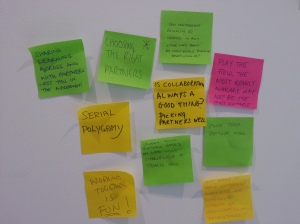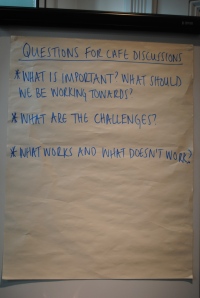On Tuesday 5th November, Collaborate hosted my research event, a Word Cafe on Partnerships. In the final blog of this series, I’d like to share some reflections on the morning.
Lord Victor Adebowale, Chair of the Collaborate Council and Chief Executive of Turning Point, opened with some provocative observations. He challenged that in our partnership practice there is a difference between the ideal and the reality. He reminded us of the reasons we should collaborate; 1) to make the most of the limited resources and 2) to make services easier to navigate. He also said:
“But we are not very good at it.”
And this is at the heart of this research project, essentially I want to know how we get better at it.
During the Cafe conversations, we looked at the 4 themes; strategic partnership,values-based approach, reflective practice and the skills and attributes of a good partner. One of the really good things about the social sector is that we know how to talk to each other. The flip side of this is that quite often we immerse ourselves in those conversations which can become a sort of comfort blanket. What I wanted was to create an environment that challenged people to engage in a deep conversations in a purposeful and thoughtful way. Each theme addressed the same 3 questions:
As I sat in on some of those initial discussions, I found them focused yet challenging; people were really thinking about how and what they wanted to contribute. All the participants had significant experience of working in partnership which meant everyone had something significant to contribute.
There were some surprises. Whilst it is clear that there is a need for resources, there was very little talk, if any, of austerity. Given the current economic environment, it is a difficult topic to avoid in a roomful of social sector professionals. The reference to resources was generally related to having the time and space to commit to a more focused approach. I found this really positive. I came away with the feeling that this is a course of action which can gain commitment despite financial constraints. People want to collaborate.
There was also a lack of discussion about leadership, which surprised me. Throughout the initial round-table, leadership was central to many of the conversations we had. Leadership will be key in developing partnership practice across the sector. The environment in which we work is complex; we must seek to influence leaders from the political environment, the sectors we work in and the organisations we work for if we are to create systemic, sustainable change. There is also personal accountability as colleagues and peers; partnerships are as much about individual responsibility as collective impact.
In earlier posts, I often link leaderships and values. It became clear that many people felt that whilst values are important, partnerships are not dependent on shared values. Shared outcomes are much more important. As participants discussed began to feedback on their Cafe conversations, this idea began to take shape. One participant challenged that often, partnerships are based on shared values, rather than shared goals. She then went further, suggesting that partnerships might be more succesful if organisations were to purposely seek to partner those who offer something different but who may have a similar goal.
Do shared values and similarities make us weaker partners? Do we need to diversify more? This was unexpected.This lead to perhaps one of the most unusual phrases of the session; serial polygamy. Essentially, the idea is that organisations become more flexible in their approach to partnerships, seeking new and different partners as needs grow and change. I have to say, I really like this. To be serial polygamists, it would need a level of skill, agreed values and the ability to be highly skilled reflective practitioners.
Serial polygamy; is it the future?! An exciting thought.

The Cafe conversations and the plenary sessions were really stimulating and provided the perfect environment to co-create the ideas and themes for the framework for the Good Partners Charter. Out of each of the 4 themes came 3-4 guiding principles, contributing to the Charter. My job now is present those guiding principles into a working document; something that could be used as a guide to future practice.
Towards the end, after sharing the 2 reasons why we should ‘do’ partnership, Victor said the most important thing, which is that we are ‘doing it for the people who aren’t in the room’, the beneficiaries. It is really crucial that we don’t lose sight of this. I feel passionately about this topic and this project; I believe that being good at this stuff potentially holds the key to better outcomes for our communities we live in and are part of.
I hope you have enjoyed the blog series. I’d like to thank everyone who has been a part of the project, the round-table discussions and the Cafe on Partnerships. Watch this space for the findings and, of course, the Good Partners Charter!


